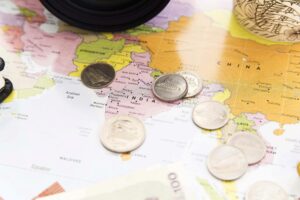Today I had a different post planned to share. But then I saw this documentary with my husband (on the recommendation of Sara from MyFrugalFunLife.com) and felt the need to share it with you.
It’s called “Food Matters” and it’s about how what we eat affects our health. It was both reassuring and reaffirming, but also convinced me to make a few changes. I’ll share them below.
If you have no sitzfleisch to watch a full length documentary now, here’s a link to the trailer which will hopefully convince you to make the time to watch the whole thing. (You can do other things while you’re watching the documentary; I was crocheting my homemade shoe.)
Part 1
Part 2
Part 3
Part 4
For a quick sum up of the video, it basically explains that the veggies grown today by non organic farming methods are very nutritionally deficient, which makes the plants weaker and more susceptible to diseases and bug infestation, etc. It goes on to share why eating organics is important, why eating raw foods are important, and how much the food we eat can affect our overall health. It talks about the different toxins we ingest on a regular basis and how many people die as a result of health problems that can be treated with proper nutrition, including vitamins and a wide array of organic produce. The documentary also challenges the belief that medicines actually help for long term health, and talks about the death tolls from different medicines.
My reactions, and/or comments after seeing this video?
1. Superfoods
Food Matters talks about the importance of eating superfoods, which are talked about in somewhat greater detail in this link below.
Superfoods from Web MD
Of the list mentioned on the Web MD site, as well as in the video, we consume on a regular basis: beans, oats, oranges, tea, tomatoes, omega 3 rich foods, spirulina, and yogurt. Beans are a staple here because of their low cost, oranges we eat in season because I find them very cheaply. Tomatoes are also eaten on a regular basis; oats are the bulk of our breakfast each morning. We imbibe tea in the form of kombucha tea, and make homemade yogurt pretty often as well.
We don’t eat so much fish because only frozen and canned fish is readily available, and the frozen stuff is injected by lots of highly toxic sodium tripolyphosphate before being imported by China, and the canned stuff is very expensive, if you look at the cost per gram. However, I did recently buy chia seeds, which are also a great source of Omega 3 fatty acids.
I have spirulina, a highly nutritious algae, in my house and we use it as a popcorn topper, but I’m always looking for more ways to incorporate it into our diet. Any suggestions would be nice.
Web MD lists soy as a superfood, for some unknown reason, but there are many more reasons to be avoiding it. So we abstain as best as we can in a country where soy oil is “the” oil, and soy is found in nearly everything!
2. Vitamins.
The documentary also talked at length about how nutritionally deficient most people are, which is the cause of disease. I’ve read a lot about phytic acid, which is an anti-nutrient and stops your body from absorbing the nutrition in the foods you eat, and it is especially prevalent in whole grains. The fact that very few people try to actually neutralize the phytic acid via soaking it in an acidic or probiotic rich medium, or via fermentation or sprouting… probably is as large a contributor to the prevalent nutritional deficiency as is fast food and uber-processed food.
I’ve been trying to be more vigilant about soaking grains and beans lately, but this video gave me the impetus to be even more careful.
I think I’ll also start taking vitamin pills (that I already own, by the way) on a regular basis.
3. Toxins and Detoxing.
I’ve been trying to rid our family of chemicals in food, but it’s been a little hard because my son, Lee, likes treats. Recently, though, he’s begun to understand that chemicals make you sick, and will ask before eating a food if it has chemicals or not. He’ll turn down foods that we tell him have chemicals, so that’ll make having a chemical free household just that much easier.
The documentary talked about how mercury in amalgam fillings puts toxins in your bloodstream; I’m very happy to share that neither myself nor my husband nor either of my kids have any amalgam fillings. This video got me even more determined that if we ever need fillings, we’ll go with the non amalgam kind. Our health isn’t worth the few dollars it would save.
As for detoxing, the kombucha we drink is a known detoxer, but I’ll try to be implementing the advice to drink more water. I definitely am not drinking enough!
4. Organics
I have to admit, the biggest change I think I’ll be making since watching this documentary is to try and eat more organic foods, if I can find a way to do that without increasing out grocery budget too much. I don’t specifically want to be feeding my family a pesticide platter, as has been stated by some readers.
Fortunately, we do have a little bit of wiggle room in our budget now, so if I can use that to increase our family’s nutrition, I’ll see what I can do. Unfortunately, the stores near me don’t sell organic produce at all, and it’s not feasible for me to take a trip into the city to buy much more expensive organic produce at this point in time.
Apparently, the eggs that I have been buying already are organic.
However, what I think I will be doing is to start buying at least some organic legumes. The store where I shop does carry organic dry goods, and he beans are perhaps approximately a quarter to 50 cents more per pound, dry, than other beans… but after calculating the true cost of beans, I think that even buying organic beans would be cheaper than buying meat or chicken, making it a worthwhile place to start and a relatively frugal way to start adding some frugal foods to our diet.
In addition to that, I’m even more encouraged to forage for as many organics as possible and barter with the few people I know locally who do grow organic veggies and fruit.
I’ll also be trying to avoid buying foods from the dirty dozen (peaches, apples, sweet bell peppers, celery, nectarines, strawberries, cherries, pears, grapes, spinach, lettuce, potatoes) if I can manage it… Fortunately, aside for potatoes, all the things on that list are things that are rarely on sale where I live, so I don’t usually buy them anyhow. Potatoes, while a sale item occasionally, are still quite expensive compared to other starches, so I think I’ll be ok skipping those as well, but no promises.
For everything else, I’ll be buying non organic but making sure to wash those vegetables very well with my homemade soap and vinegar rinse.
One day, hopefully, all our debts will be paid off and I’ll have enough spare money with which to buy organic everything, or be able to have land on which to grow my own organic produce. In the meantime, these are the baby steps I’ll be taking.
All in all? This documentary is important to watch, in my opinion. Was it life changing for me? Not necessarily, because I’ve heard and agree with most of what was said already. It just reaffirmed my convictions and gave me the encouragement to start doing just a little bit more than I’ve already been doing.
Did you watch the movie “Food Matters”? What was your reaction to it? Positive thoughts, or did you disagree with it?
If you agreed with it, do you plan on making any changes in your life once watching it? If so, what?
Do you soak grains and legumes, or have you ever heard of it before?
Do you have amalgam fillings in your teeth?
Do you think organic is important? If not, why not? Do you buy anything organic? If so, what?
I’d like to hear your thoughts on my reaction to this video.





